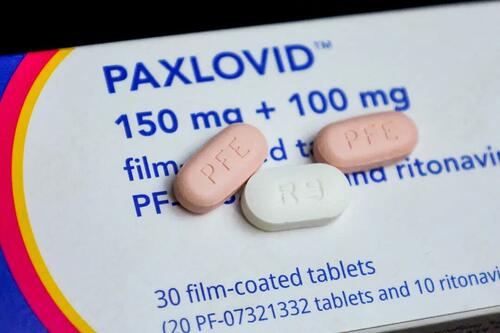Authored by Amie Dahnke via The Epoch Times (Emphasis ours),

Paxlovid, an antiviral medication prescribed to treat symptoms associated with COVID-19, does not reduce the risk of developing long COVID in vaccinated people recovering at home.
The report comes from a new study published in the Journal of Medical Virology on Thursday. Conducted by a team of researchers from the University of California–San Francisco, the study also found that more people are experiencing rebounds of their COVID symptoms after taking Paxlovid (nirmatrelvir-ritonavir) than previously reported.
Paxlovid is the first antiviral pill approved by the U.S. Food and Drug Administration (FDA) to treat mild and moderate COVID-19 in adults. It is typically prescribed to those at high risk of having the virus progress to a severe illness, including hospitalization or death. The medication has also been authorized for use in children 12 and older who are at risk of severe outcomes from COVID-19.
According to manufacturer Pfizer, initial trials of Paxlovid showed it reduced hospitalizations and death in unvaccinated COVID patients by 86 percent to 89 percent. A real-world study conducted by the U.S. Centers for Disease Control and Prevention (CDC) showed that adults who took Paxlovid within the first five days of a COVID-19 diagnosis had a 51 percent lower hospitalization rate within 30 days than those who did not take the medication. More recent studies have indicated lower efficacy rates, with patients having about 37 percent reduced hospitalization and death risk.
However, no study has pointed to whether the drug helps protect people from getting long COVID, noted authors of the UC San Francisco study.
Paxlovid Did Not Prevent Long COVID
To determine if Paxlovid protects against long COVID, the research team examined over 4,600 vaccinated individuals from the UC San Fransisco COVID-19 Citizen Science study who experienced their first positive COVID-19 tests between March and August 2022. None of the patients was hospitalized. About 20 percent of patients took the three-pill course of Paxlovid, while about 80 percent did not.
In December 2022, the patients answered a follow-up survey that included questions about long COVID, COVID rebound symptoms, and how long they continued to test positive.
“We found a higher proportion with clinical rebound than previously reported, but did not identify an effect of posttreatment rebound on Long COVID symptoms,” researchers wrote.
The team found little difference between the two groups. For example, roughly 16 percent of patients prescribed Paxlovid had long-COVID symptoms compared to about 14 percent who were not prescribed the medication. Long-COVID patients in each group experienced fatigue, shortness of breath, confusion, headache, and changes in sense of smell and taste.
Paxlovid Rebound Symptoms Confirmed
The UC San Francisco study reported that just over 1 in 5 individuals (21 percent) who reported getting better after taking Paxlovid experienced rebound symptoms, or a return of their COVID symptoms. Among those who experienced rebounds, 10.8 percent reported one or more long-COVID symptoms.
Additionally, retesting positive was common among rebound patients; 25.7 percent of individuals who took Paxlovid and repeated antigen testing after testing negative ended up testing positive.
In all, just over 26 percent of participants reported either rebound symptoms or test positivity, the study noted.
Of the roughly 75 percent who didn’t experience rebound while on Paxlovid, 8.3 percent reported at least one long-COVID symptom.
The study echoes a Nov. 13, 2023, study conducted by Harvard Medical School (HMS) researchers also indicating that 1 in 5 individuals who took Paxlovid experienced a rebound of symptoms.
“We conducted this study to address lingering questions about Paxlovid and virologic rebound in COVID-19 treatment,” senior author Dr. Mark Siedner, associate professor of medicine at HMS and an infectious disease clinician and researcher at Massachusetts General Hospital, said in a HMS press release. “We found that the virologic rebound phenomenon was much more common than expected—in over 20 percent of people taking Paxlovid—and that individuals shed live virus when experiencing a rebound, which means they may be contagious after initial recovery.”
Previous clinical trials suggested that between 1 percent and 2 percent of patients who took Paxlovid experienced rebound, according to the press release.